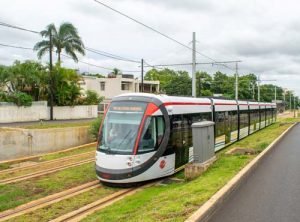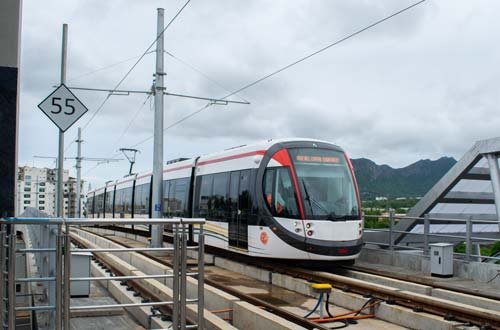 The Mauritius Metro Express is by far the largest infrastructure project in the history of Mauritius funded through a Government of India Line of Credit including a separate grant element as part of enhancing bilateral ties between India and Mauritius. The Mauritius Metro Express is a Light Rail Vehicle (LRV) based Transit system being built by Larsen & Toubro Limited.
The Mauritius Metro Express is by far the largest infrastructure project in the history of Mauritius funded through a Government of India Line of Credit including a separate grant element as part of enhancing bilateral ties between India and Mauritius. The Mauritius Metro Express is a Light Rail Vehicle (LRV) based Transit system being built by Larsen & Toubro Limited.
The 26-km route connects the business hubs of Port Louis to all the major urban centers, and is also poised to boost Transit Oriented Development. Rajeev Jyoti, Chief Executive, Railways SBG, L&T Construction, said, “The project features 19 stations (two of which are elevated, state-of-the art stations) and the alignment connects three major bus interchanges, for a multimodal, seamless travel experience to commuters.”
The Mauritius Metro features 100% low floor Light Rail Vehicles with high transit capacity, multiple track forms for best-in-class urban design to mitigate noise and vibration, energy-efficient traction power supply systems, signaling systems to ensure safe movement in urban spaces/traffic intersections, construction of depot along with maintenance equipment, a state-ofthe art Operation and Control Centre, simulators for rapid driver training and passenger-friendly electronic ticketing and information systems.
[box type=”shadow” ]
The Urban Transportation system has been well received by the general public, media and so far about a million passengers have travelled in the metro since its launch.
[/box]
 On Time Commitment
On Time Commitment
Starting from a greenfield, the priority section of 13km was completed within a span of 24 months and inaugurated by the Prime Ministers of India and Mauritius on Oct 4, 2019. The System is a first of its kind integrated LRT project being executed by an Indian company overseas and is one of the fastest executed Transit Systems in L&T’s track record. “ Our approach has been to provide a modern and distinctive solution by implementing cost-effective construction methods to enhance speed of execution with minimum disturbance to the people,” Jyoti mentioned.
Indo-Mauritian Relation
The ‘Track to Train’ project not only marks a new high in Indo-Mauritian relations but also brings in huge economic advantages owing to the fact that such projects add significant value from India through a products and services perspective and enhances the image of India as a source of specialized technologies – perhaps a harbinger for more such systems in the region.
The Urban Transportation system has been well received by the general public, media and so far about a million passengers have travelled in the metro since its launch. Regular commuters include youngsters, elderly persons and even Parliament Members. Phase 2 of the project is progressing at a rapid pace and well placed to complete ahead of time.
Digitalization to the fore
 To improve operational efficiency and plan site activities. the project has adopted several digital solutions. PROCUBE is a digital solution that monitors project progress while EMTRACK monitors material stock for more efficient supply chain management. Asset Insight is a GPSbased solution to monitor construction assets engaged at the project. These digital solutions provide data for engineers, supervisors and even the leadership to identify risks, detect trends, patterns and take informed decisions.
To improve operational efficiency and plan site activities. the project has adopted several digital solutions. PROCUBE is a digital solution that monitors project progress while EMTRACK monitors material stock for more efficient supply chain management. Asset Insight is a GPSbased solution to monitor construction assets engaged at the project. These digital solutions provide data for engineers, supervisors and even the leadership to identify risks, detect trends, patterns and take informed decisions.
Use of mobile and web based solutions like RFI to raise, approve and monitor RFIs (Requests for Inspection) and TCO Work permit System to schedule and obtain clearances for working on track are both solutions ensuring quality of work and safe working environment for all workmen and staff engaged. EDMS, a project specific website is implemented to communicate and engage all key stakeholders, both internal and external on a digital platform. Other solutions like WCS (Wage Calculation system) help improve efficiency in administration of the project in terms of recording of attendance and automated calculations.
The project has had two major challenges; Geographical separation and Manpower. Set in Indian Ocean, the island nation is distant from India and hence planning is extremely critical with regard to skilled labor, Plant & Machinery, track specific materials and other long lead items.
Railways having been defunct in Mauritius since 1955, domain specific skilled manpower had to be moved from India At the same time, to bring in country value, a major portion of Mauritian workmen were domaintrained by L&T.
Rahul Kamat
